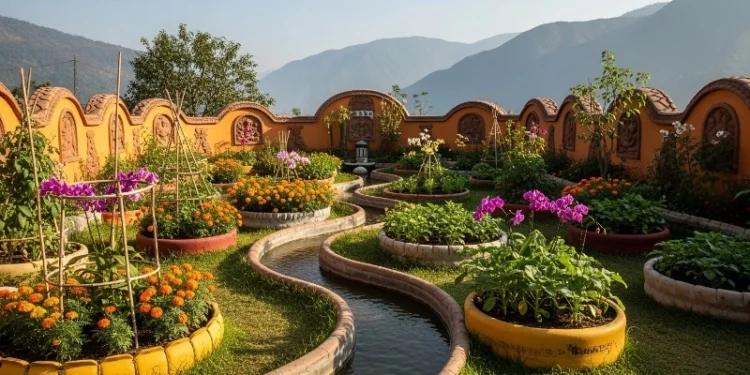Organic farming has become an important part of the global movement towards sustainable agriculture. In Nepal, where agriculture plays a key role in the economy and the livelihoods of many people, organic farming is gaining popularity.

It offers numerous benefits not only to the environment but also to farmers, consumers, and the country as a whole. This blog post will explore the various advantages of organic farming in Nepal and how it can lead to a more sustainable future
Organic farming focuses on maintaining and improving the quality of the soil, which is crucial for sustainable agriculture. Unlike conventional farming, which relies heavily on chemical fertilizers, organic farming uses natural methods to enhance soil fertility. Composting, crop rotation, and the use of green manure are common practices that help enrich the soil.
1. Improved Soil Health
In Nepal, where many farmers rely on the land for their livelihood, preserving soil health is essential. Healthy soil leads to better crop yields and ensures long-term productivity.
Organic farming helps maintain the natural balance of nutrients in the soil, prevents erosion, and enhances water retention. This is especially important in a country like Nepal, where mountainous terrain and erratic rainfall can cause soil degradation.
One of the key principles of organic farming is the avoidance of synthetic chemicals, such as pesticides and fertilizers.
In conventional farming, these chemicals are often used to increase yields, but they can have negative effects on the environment and human health. Pesticides can contaminate water sources, harm wildlife, and affect the health of farmworkers and consumers.
2. Reduced Use of Chemicals
By using natural alternatives, organic farming reduces the risk of chemical pollution. In Nepal, where access to clean water is a challenge in many rural areas, reducing chemical runoff is crucial for maintaining the quality of water sources.
Organic farming methods, such as using neem oil or other natural pest control techniques, help protect the environment while still ensuring healthy crops.
One of the most significant benefits of organic farming is that it produces healthier food. Organic crops are grown without the use of synthetic pesticides and fertilizers, which means that consumers are less likely to be exposed to harmful chemicals.
Studies have shown that organic produce often contains higher levels of essential nutrients, such as vitamins and minerals, compared to conventionally grown food.
3. Healthier Food for Consumers
In Nepal, where access to nutritious food is limited in many areas, organic farming can play an important role in improving public health.
By consuming organic products, people can reduce their intake of harmful chemicals and enjoy healthier, more nutritious food. This is particularly beneficial for children, pregnant women, and other vulnerable populations who are more sensitive to the effects of chemicals in food.
Organic farming is closely linked to environmental sustainability. By using natural farming methods, organic farmers help preserve biodiversity, protect ecosystems, and reduce pollution. In Nepal, where the natural environment is a vital part of the country’s identity and economy, preserving the land and water resources is critical.
4. Environmental Sustainability
Organic farming promotes practices that enhance biodiversity, such as crop rotation and the use of natural pest control methods.
This helps maintain a balance between crops and the surrounding ecosystem, ensuring that wildlife and beneficial insects can thrive. In addition, organic farming reduces the use of fossil fuels, as it relies less on machinery and chemical inputs, which contributes to lower greenhouse gas emissions.
Organic farming can provide farmers with better livelihoods by improving their income and reducing their dependency on expensive chemical inputs.
In Nepal, many small-scale farmers struggle to afford the high costs of synthetic fertilizers and pesticides, which can lead to debt and financial insecurity. Organic farming offers a more cost-effective solution by relying on locally available resources, such as compost and natural pest control methods.
5. Better Livelihoods for Farmers
Additionally, organic products often fetch higher prices in the market, as there is a growing demand for healthier and more environmentally friendly food.
By transitioning to organic farming, Nepali farmers can tap into this growing market and improve their incomes. Moreover, organic farming is labor-intensive, which means that it can create more employment opportunities in rural areas, helping to reduce poverty and support local communities.
Organic farming aligns closely with many traditional farming practices that have been used in Nepal for centuries. Before the introduction of chemical fertilizers and pesticides, Nepali farmers relied on natural methods to grow their crops, such as using animal manure and practicing crop rotation. Organic farming builds on these traditional methods and adapts them to modern needs.
6. Preservation of Traditional Farming Practices
By embracing organic farming, Nepali farmers can preserve their agricultural heritage while also benefiting from modern innovations.
This not only helps protect the environment but also strengthens the cultural identity of rural communities. In a rapidly changing world, preserving traditional knowledge and practices is essential for maintaining the country’s agricultural diversity and resilience.
Climate change is a growing concern worldwide, and Nepal is no exception. The country is highly vulnerable to the effects of climate change, including erratic weather patterns, floods, and landslides. Organic farming can play a role in mitigating climate change by reducing greenhouse gas emissions.
7. Reduced Greenhouse Gas Emissions
Conventional farming relies heavily on synthetic fertilizers, which release large amounts of nitrogen oxide, a potent greenhouse gas, into the atmosphere.
Organic farming, on the other hand, uses natural fertilizers like compost, which do not contribute to greenhouse gas emissions. Additionally, organic farming practices such as crop rotation and cover cropping help sequester carbon in the soil, further reducing the overall carbon footprint of agriculture.
Biodiversity is crucial for the health of ecosystems, and organic farming helps promote biodiversity in several ways. First, organic farmers often plant a variety of crops rather than relying on monocultures. This helps create a more diverse and resilient ecosystem, which can better withstand pests, diseases, and changing environmental conditions.
8. Promotion of Biodiversity
In Nepal, where agriculture is deeply intertwined with the natural environment, promoting biodiversity is essential for ensuring the long-term sustainability of farming.
Organic farming also encourages the use of native plant varieties, which are better adapted to local conditions and require fewer inputs. By promoting biodiversity, organic farming helps protect Nepal’s rich variety of plant and animal species.
Water is a precious resource in Nepal, and the conservation of water is one of the key benefits of organic farming. Conventional farming often requires large amounts of water for irrigation, especially when chemical fertilizers are used, as these chemicals can make the soil less capable of retaining water. Organic farming practices, such as using mulch and compost, help improve the soil’s ability to retain water, reducing the need for irrigation.
9. Conservation of Water Resources
In a country where access to clean water can be limited, conserving water is critical for ensuring the long-term sustainability of agriculture. Organic farming helps protect water resources by reducing chemical runoff, preventing water pollution, and ensuring that water is used efficiently.
Organic farming promotes innovation and education in agriculture. As farmers transition to organic methods, they must learn new skills and techniques to manage their farms sustainably. This encourages a culture of continuous learning and improvement, which is beneficial for the entire agricultural sector in Nepal.
10. Encouragement of Innovation and Education
Many organizations and NGOs in Nepal are working to provide training and support to farmers who are interested in organic farming.
These programs help farmers gain the knowledge they need to successfully transition to organic practices, and they also promote research into new and innovative farming methods.
By encouraging innovation and education, organic farming is helping to build a more resilient and sustainable agricultural sector in Nepal.
FAQs
1. What is organic farming?
Organic farming is a method of agriculture that avoids the use of synthetic chemicals, such as pesticides and fertilizers. It relies on natural methods to maintain soil health and control pests.
2. Why is organic farming important in Nepal?
Organic farming is important in Nepal because it helps protect the environment, improves soil health, and provides healthier food for consumers. It also supports rural livelihoods and preserves traditional farming practices.
3. What are the benefits of organic food?
Organic food is free from harmful chemicals, making it healthier for consumers. It often contains higher levels of essential nutrients and is better for the environment.
4. How does organic farming help the environment?
Organic farming helps the environment by reducing chemical pollution, promoting biodiversity, conserving water, and reducing greenhouse gas emissions.
5. Can organic farming improve farmers’ incomes?
Yes, organic farming can improve farmers’ incomes by reducing the need for expensive chemical inputs and allowing farmers to sell their products at higher prices.
6. Is organic farming more labor-intensive?
Yes, organic farming is often more labor-intensive because it requires careful management of soil health, pest control, and crop rotation. However, this can also create more employment opportunities in rural areas.
7. How does organic farming promote biodiversity?
Organic farming promotes biodiversity by encouraging the use of a variety of crops and natural pest control methods, which help create a more resilient ecosystem.
8. What role does water conservation play in organic farming?
Water conservation is an important part of organic farming, as organic practices improve soil structure and water retention, reducing the need for irrigation and protecting water resources.
9. How can farmers transition to organic farming?
Farmers can transition to organic farming by gradually reducing their use of synthetic chemicals, adopting natural methods for soil and pest management, and seeking training and support from organizations that promote organic agriculture.
10. Is organic farming suitable for small-scale farmers in Nepal?
Yes, organic farming is particularly well-suited for small-scale farmers in Nepal, as it relies on locally available resources and can help improve the sustainability and profitability of small farms.






